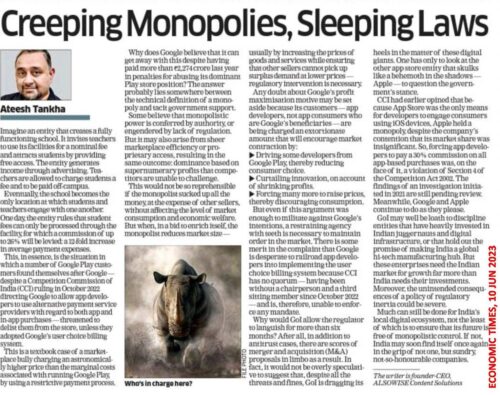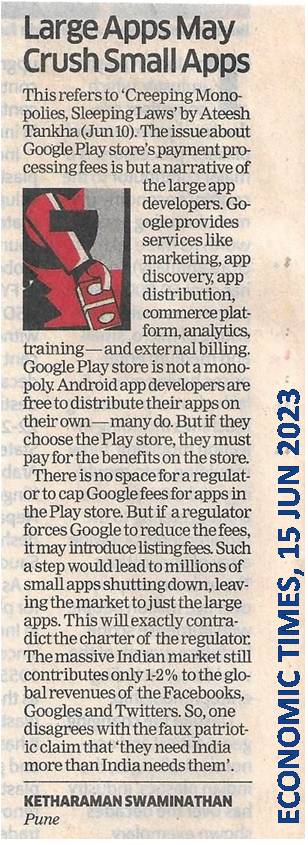Google Play Store provides the following services to Android app developers:
- Listing
- Discovery
- Distribution
- Commerce platform
- Training
Google does not charge any fixed fees for these services.
Like most companies in their early days, app developers are short of funds when they start out. While they have aspirations to build for the world, do marketing, become big, and so on, they don’t have the money to pay upfront for what it takes to get there. Accordingly, they exhort their suppliers to have “skin in the game” and work on “revshare”, which is a pricing model in which there’s no fixed fees, and all of the fees are variable i.e. based on outcome aka “rake”.
A contingency agreement is an arrangement between a plaintiff and a lawyer, stating that the lawyer will represent the plaintiff without money to pay up front. In these situations, the plaintiff pays the lawyer only if the lawyer wins the case. In the event of a settlement agreement for the plaintiff, the lawyer keeps the percentage of the award agreed upon beforehand. – Sweeney Merrigan Personal Injury Lawyers.
This might remind some readers of “contingency lawsuits” in the USA.
Victims of personal injuries and ecological disasters often don’t have funds to sue large corporations for damages. Law firms represent them on “contingency basis” wherein they represent the aggrieved plaintiffs without taking any fixed fees. If they win the trial, they typically take 33% of the damages awarded to the victims. The losing corporation pays the damages to the law firm, which retains its 33% and remits the balance 67% to the victims.
In line with their demand, Google did not (and still does not) charge app developers any fixed fee for the aforementioned services provided by its Play Store. As a result, millions of app developers get to use Play Store as a free distribution platform.
I can vouch for this from personal experience: When my company pitched its marketing solutions to them in the early days of Play Store, Tech Bros would tell us, “We’re on Play Store, why do we need you?” Fair point. Since we didn’t support the revshare model, we stopped pursuing this market segment.
Out of the zillions of apps, very few apps have paid versions. Play Store provides seamless payments processing for them and retains 30% on the Total Payments Value (TPV) processed.
While Google collects it at the point of payment, the rake covers the aforementioned slew of services provided by Play Store – and not just payments processing. (Just as the 33% of settlement retained by contingency lawyers is not the cost of processing payments but their variable fees for providing legal services without charging any upfront fees.)
The revshare model totally meets Tech Bros’ demand for outcome-based pricing.
It has worked fine in its original form for the zillions of free apps on Play Store. They don’t make any money from their users and they don’t pay any money to Google. Still they get free eyeballs, which they typically monetize via ads without paying a penny to Google Play Store.
However, the revshare model started pinching the few big app developers. Finding the 30% rake very steep, they started demanding fixed fees. But, after investing in building a platform for over a decade, Google is in no mood to give up its skin in the game when it’s time for payback. So, Google is sticking to its guns and has already issued notices to app developers to cough up its 30% rake or quit its Play Store.
You can make out a merchant's size from their stance on payment processing fees. A small merchant will talk about skin in the game and want variable fees. A big merchant will rant against rent seeking and want fixed fees.
— Ketharaman Swaminathan (@s_ketharaman) April 1, 2023
In response, panicked app developers have thrown shade on Google for “rent seeking”. They have tagged the 30% rake as pure payments processing fees, conveniently ignoring listing, distribution and other benefits provided by Play Store. Stating that they can get payments processed outside for 3-4% MDR, they have railed at Play Store’s 30% rake as extortionate. (Note that this is not the narrative of small / free app developers on Play Store, who have no payments to be processed within or without Play Store).
In response, Google allowed them to use external billing / payments processors and reduced Play Store fees from 30% to 26%, in effect telling app developers, “Since you say you can get payments processed outside Play Store for max 4%, pay 26% for the other (non-payments) services provided by Play Store” (see footnote 1).
Classic case of ignoring jargon and getting screwed. Startups probably thought the 30% deducted from payments was payment processing fees. They didn't realize it was 30% variable fees charged by Google for their use of Play Store, just levied at the point of payment. https://t.co/UiReA4Ck88
— Ketharaman Swaminathan (@s_ketharaman) April 21, 2023
App developers got blindsided by this move and responded by accusing Google of being a monopoly and alleging that its 26% fees is an abuse of monopoly, as the author of the op-ed titled Creeping Monopolies, Sleeping Laws does in The Economic Times dated 10 June 2023.

I’m not sure if the author is a large app developer or a shill for large app developers. But, either way, both of his charges are ludicrous.
Monopoly of "being an easy to use interface"? That's a new one.
I only thought Zerodha was a monopoly of being the only brokerage company whose name starts with Z and ends with A. https://t.co/kLppFvz5CR— Ketharaman Swaminathan (@s_ketharaman) October 12, 2023
Apple insists that all iOS apps must be installed only from its AppStore. In other words, it does not permit “sideloading” of its apps from external app stores or even from the app developer’s own website. Despite that, the US courts ruled that Apple is not a monopoly. Which is a sensible verdict since Apple is not the only seller in the smartphone market.
… a lot of fights in antitrust are about definition of “relevant market”. The government will say that you are dominant in the market for social media, and you will say “no we are a tiny fraction of the market for human interaction.” – Footnote # 11 of Money Stuff by Matt Levine dated 14 September 2023.
For the uninitiated, monopoly is defined as “a market in which there’s only one seller”.
Now, if you define any market narrowly enough, you’d be able to claim that even the streetside vendor outside your house is a monopoly e.g. “GTM360 is a monopoly because it’s the only provider of marketing solutions whose name starts with G and ends with 0”.
But good luck getting the antitrust regulator or courts to agree with you.
Also, monopoly by itself is not a crime – if it were, the PG&Es and MSEBs of the world would have been shut down long ago. In fact, I recall Matt Levine mentioning in a Money Stuff column that, in the energy utility industry, regulation is written to create monopoly.
Google has always permitted Android apps to be installed from outside Play Store. App developers regularly publish the so-called APK file of their apps on their own websites. With such an open policy towards sideloading, I doubt if the charge of monopoly against Google will stick.
 Play Store dominates Android app distribution because it provides compelling value, not because there’s any government decree banning other Android app stores. Alternative app stores exist and app developers are free to use them. (I also recall talk of a Bharat AppStore for Indian mobile apps a few years ago.) If app developers still choose to use Play Store, it’s because they get benefits from Play Store that they don’t get elsewhere (Per anecdata 90% of their traffic comes from Play Store.) That being the case, they must jolly well pay for those benefits – that’s how business works. In a capitalism, consumers pay because they get benefits, not to provide financial support to suppliers. Therefore, I doubt if the charge of abuse of monopoly will stick either.
Play Store dominates Android app distribution because it provides compelling value, not because there’s any government decree banning other Android app stores. Alternative app stores exist and app developers are free to use them. (I also recall talk of a Bharat AppStore for Indian mobile apps a few years ago.) If app developers still choose to use Play Store, it’s because they get benefits from Play Store that they don’t get elsewhere (Per anecdata 90% of their traffic comes from Play Store.) That being the case, they must jolly well pay for those benefits – that’s how business works. In a capitalism, consumers pay because they get benefits, not to provide financial support to suppliers. Therefore, I doubt if the charge of abuse of monopoly will stick either.
For the uninitiated, pricing power does not in itself constitute abuse of monopoly. Credit card interchange fees has stayed in the same 2-3% range in the entire 70 year history of the credit card industry (50 years in India). So, it’s correct to say that credit card issuers have pricing power. But that doesn’t mean the JP Morgan Chases and Barclayses and HDFC Banks are monopoly since there are hundreds of banks issuing credit card in their respective markets. Then there are the Microsofts and Oracles and SAPs in the IT industry who have acquired pricing power via vendor lockin and other means that shrinking violets may find unethical, but bottomline is none of them has been convicted for abuse of monopoly. (Disclosure: Oracle is my ex-employer.)
Some shills of Tech Bros claim that app developers don’t want the other services of Google, so why should they pay 26% rake. If that’s true, they should publish their apps outside Play Store and get their payments processed by alternative billing platforms – both of which are possible – and pay zilch to Google. Their demand of unbundling of services and pricing becomes moot.
Since they’re not doing that either, it’s obvious that they’re trying something else here: They want to use Play Store but on their terms. In short, they’re behaving like a monopsony (“single buyer market”) and acting like merchants in other industries who want to have their cake and eat it too, as I’d pointed out in my decade-old post. Good luck getting away with that attitude.
The author of the above op-ed also taunts the Government of India for inaction surmising that it might be “loath to discipline entities that have heavily invested in Indian juggernauts and digital infrastructure” and claims that Google et al need the Indian market more than India needs their investments.
This is BS. The population of India does provide a large market for multinationals, but it’s only by volume. By value, the Indian market contributes less than 2% of their global revenues: To be precise, it’s 1.82% for Facebook / Meta, 1.28% of Google / Alphabet, and 0.32% for Twitter. (It’s arguably even less for Amazon since it’s a pure marketplace in India and counts only a small percentage of GMV on its platform as its revenues as against entire GMV in USA and other markets where it’s a retailer). On the other hand, investments by these MNCs in India amount to way more than 2% of India’s FDI receipts. So I disagree with the author’s faux patriotic claim that “they need India more than India needs them”.
I hope the regulator and courts don’t fall for the ruse of large app developers and their shills. Once they call their bluff, we’ll know whether Tech Bros find it cheaper to pay Google’s rake and stay on Play Store or pay somebody else to distribute their apps outside Play Store (which is exactly what we’d proposed to them nearly a decade ago.)
In the India of last 20-25 years, there’s no price control on food, clothing, education, healthcare and other basic necessities.
I see no reason why the regulator should cap the fees that Google can charge apps for using its Play Store.
In the past, I’ve given kudos to other regulators for not interfering in pricing.
@s_ketharaman: “We Have No Role In IPO Pricing” ~ SEBI. Kudos to SEBI for upholding capitalism. This will ensure that investors stay smart, take responsibility for their actions instead of running to the government for everything as though they’re living in a Nanny State.
Despite all this, if the competition regulator becomes overzealous – à la some other regulators we could mention – and forces Play Store to reduce its fees for paid apps, there’s nothing stopping Google from discontinuing free listing of apps. Google could very well retaliate against such an egregious act of regulatory overreach by levying listing fees for all apps. If it does that, a vast majority of app developers will be snuffed out. The market will be dominated by the handful of large app developers, which goes exactly against the regulator’s remit to prevent overconcentration.
It’s one thing for politicians to hype up digital payments as a smokescreen to divert the public’s attention from lack of food, water, electricity, jobs and other basic necessities. But it’s another thing for the common man to delude himself into believing that digital payments will solve global hunger, and completely miss the basic truth that a guy who doesn’t have money for food is going to be hungry even with Google Pay. See this Quora Q & A for an example of such a brainwashed common man.
Unfortunately, it’s not just the Average Joe / Jane. I’ve even come across seasoned payments professionals who forget that it’s an SOP for business to operate on 30-60-90 days credit and chastise companies for six weeks payments SLA when UPI supports realtime payments!
Oh c'mon what does contractual payment terms have to do with RTP capability?
Many Indian companies commit 30-60 days payment, pay after 90-120 days, that too after tremendous follow up, none of which is directed at RBI / NPCI to expedite payment on UPI / NEFT / IMPS / RTGS rails.— Ketharaman Swaminathan (@s_ketharaman) August 20, 2022
So far, I’ve accused large app developers of conveniently ignoring listing and other services provided by Play Store. But, on second thoughts, maybe even they’re so drunk on the Kool-Aid of digital payments that they have forgotten about all those other services provided by Play Store and genuinely believe that the 30% fees levied by Google is only for processing payments! If so, they should go to the top of this page and start reading this post again. And, while at it, they should find ways to provide compelling value and acquire pricing power for themselves instead of whining about the hegemony of Google.
The Economic Times published a condensed version of my above post on 15 June 2023.
FOOTNOTES:
- 26% is the highest rate in the new Play Store pricing structure – what was 30% inclusive of payments processing before has become 26% without payments processing now. Depending on the app category and other attributes of the app developer, the fees can be as low as 14% (excluding payments).

